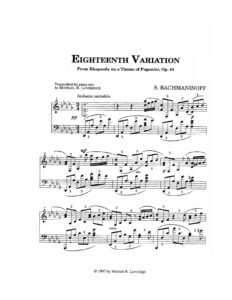Browse in the Library:
Search Posts by Categories:
18th Variation by Rachmaninoff from Rhapsody on a theme by Paganini (piano solo arr.) – Katalin Zsubrits, piano. Sheet music download from our Library.
The Rhapsody on a Theme of Paganini, Op. 43, (Russian: Рапсодия на тему Паганини, Rapsodiya na temu Paganini) is a concertante work written by Sergei Rachmaninoff for piano and orchestra, closely resembling a piano concerto, all in a single movement. Rachmaninoff wrote the work at his summer home, the Villa Senar in Switzerland, according to the score, from 3 July to 18 August 1934.
Rachmaninoff himself, a noted interpreter of his own works, played the piano part at the piece’s premiere on 7 November 1934, at the Lyric Opera House in Baltimore, Maryland, with the Philadelphia Orchestra conducted by Leopold Stokowski. Rachmaninoff, Stokowski, and the Philadelphia Orchestra made the first recording, on 24 December 1934, at RCA Victor’s Trinity Church Studio in Camden, New Jersey.
After a brief introduction, the first variation is played before the theme. Paganini’s theme is stated on strings with the piano picking out salient notes, after the first variation. Rachmaninoff likely got the idea of having a variation before the theme from the finale of Beethoven’s Eroica symphony. Variations II to VI recombine elements of the theme. The pauses and rhetorical flourishes for the piano in variation VI herald a change of tempo and tone.
The piano next gravely intones the Dies Irae, the “day of wrath” plainchant from the medieval Mass of the Dead, while the orchestra accompanies with a slower version of the opening motif of the Paganini theme. The piece is one of several by Rachmaninoff to quote the Dies Irae plainchant melody.
The slow 18th variation is by far the best known, and it is often included on classical music compilations without the rest of the work. It is based on an inversion of the melody of Paganini’s theme. In other words, the A minor Paganini theme is literally played “upside down” in D♭ major, with a few other changes. Rachmaninoff himself recognized the appeal of this variation, saying “This one, is for my agent.”
The 18th variation, by far the most popular, has been used in various movie and TV show soundtracks to different degrees. This includes: The Story of Three Loves (1953) Somewhere in Time (1980 film) Singapore Sling (1990 film) Dead Again (1991) Groundhog Day (1993 film) Ronin (1998 film) The Byron James Story (2010 TV movie documentary) Nikolina and Tomislav (2013 short) Alive Inside: A Story of Music and Memory (2014 documentary) The Good Wife (2015) The pop song “If I Had You” by The Korgis uses the melody fragment from the 18th variation.
The video game Gran Turismo 6 uses it as the intro theme.

